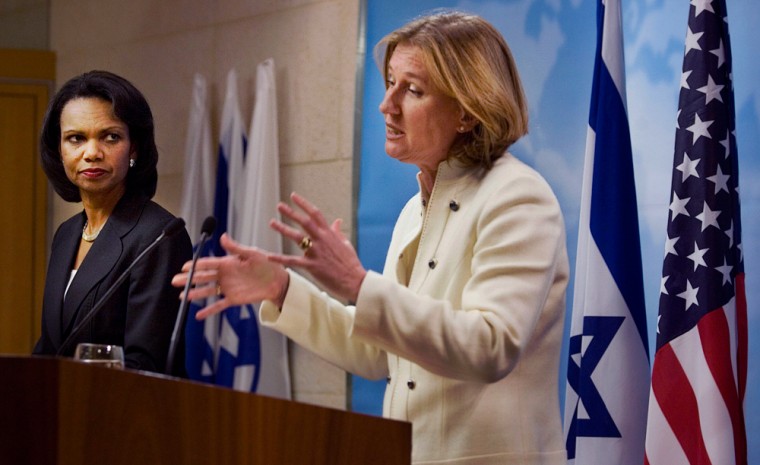Secretary of State Condoleezza Rice said that the proposed U.S.-hosted Mideast conference would be a “stop in a process” — and appeared to be lowering expectations — as new tensions erupted when the Palestinian leader accused Israel of hampering preparations.
Israeli Foreign Minister Tzipi Livni said the goal of current talks with Palestinians is to reach an understanding “as wide as possible in time available” ahead of an upcoming peace conference. Livni, who spoke after a meeting with Rice, heads the Israeli negotiating team working with Palestinian counterparts to prepare for the conference.
Palestinian President Mahmoud Abbas said Israeli army raids and a decision to renew excavations near a key Jerusalem holy site “are hindering the endeavor to reach a document with substance, to go to the conference.”
Abbas warned that little time is left to prepare for the conference. “We must not waste time,” he said.
Wrapping up four days of shuttle diplomacy, Rice urged Arab countries to “rally” in support of the conference. Arab countries have been hesitant to commit to attending, saying they want guarantees of firm progress.
“We are showing the parties that there is a basis for moving forward,” Rice said. “It is a stop in a process” aimed at achieving a Palestinian state living in peace alongside Israel, she added.
Bush: 'Now is the time'
In Washington, President Bush said he wants Israelis and Palestinians to outline their views on creating a Palestinian state at the conference to be held in November or December in Annapolis, Md.
“We believe that now is the time to push ahead with a meeting at which the Israelis and Palestinians will lay out a vision of what a state could look like,” Bush told a White House news conference. “The Palestinians that have been made promises all these years need to see there’s a serious, focused effort to step up a state.”
Bush said a state would give those who reject extremism something to hope for.
Rice started her day with a visit to Jesus’ traditional birthplace in the West Bank town of Bethlehem. Rice, the daughter and granddaughter of Presbyterian ministers, lit a candle in the grotto and paused for prayer.
“Being here at the birthplace of my Lord and Savior, Jesus Christ, has been a very special and moving experience,” said Rice. “It is also, I think, a personal reminder that the prince of peace is still with us.”
She said the three monotheistic religions of the Holy Land, Judaism, Christianity and Islam, “have an opportunity to overcome differences, to put aside grievances, to make religion a power of healing and a power of reconciliation, rather than a power of divisions.”
Rice visits West Bank barrier
In Bethlehem, Rice got a firsthand look at Israel’s contentious West Bank separation barrier, which lines the town on two sides.
Her convoy passed twice through a gate in the towering wall that cuts off Bethlehem from Jerusalem. Also, the hotel where she met civic leaders was just a few yards from the wall and an Israeli watchtower.
Israel started building the West Bank barrier in 2002, initially portraying it as a temporary defense against Palestinian attackers who have killed hundreds of Israelis in recent years. However, the barrier’s meandering route and massive cost suggest it could be used as the basis for a future border.
Bethlehem residents need difficult-to-obtain permits to cross into Jerusalem, and long lines often form during rush hour.
Joint document of principles
Israeli and Palestinian negotiators are trying to write a joint document of principles that would guide future peace talks. Tensions arose earlier in the week when Prime Minister Ehud Olmert said such a document is not a prerequisite for the Annapolis conference.
The Palestinians insist on such a document, even if it contains only a sentence or two about the core issues, such as the fate of disputed Jerusalem, borders, Israeli settlements in the West Bank and Palestinian refugees. They want the conference to relaunch peace talks, and seek an internationally backed deadline for reaching a peace agreement.
The U.S. appears to favor the idea of a document, but has been cool to the notion of a timeline.
The U.S. has not set a date yet or issued invitations but hopes key Arab states, including Egypt, Jordan and Saudi Arabia, will attend. Arab leaders have said that before accepting an invitation, they want to be sure the conference deals with substance.
U.S. credibility at stake?
A senior Abbas aide, Nabil Abu Rdeneh, said the gaps between the Israeli and Palestinian positions remain wide, and that “the credibility of the U.S. administration depends on the pressure that it is willing to exert on Israel.”
Palestinian negotiator Saeb Erekat said a final deal should be concluded before U.S. election campaigning gets into high gear next summer.
“After that, all the U.S. will be busy with the election in the U.S.,” Erekat said.
Abbas harshly criticized Israel. “There is continuous Israeli aggression while our security forces are trying to impose law and order,” he said, but it was not clear whether he was referring to a specific incident. On Tuesday, Israeli troops killed a 70-year-old Palestinian man in a raid in the West Bank city of Nablus.
Another Abbas aide, Ahmed Abdel Rahman, said the Palestinian president told Rice that Israel should release 2,000 Palestinian prisoners as a gesture at the time of the conference. More than 11,000 Palestinians are held in Israel on security-related charges.
Israeli Foreign Ministry spokesman Mark Regev acknowledged that gaps exist between Israeli and Palestinian negotiators.
“What is required is serious work and we are committed to that,” he said. “Ignoring that gap is to ignore reality and a successful peace process cannot be based on ignoring reality.”
